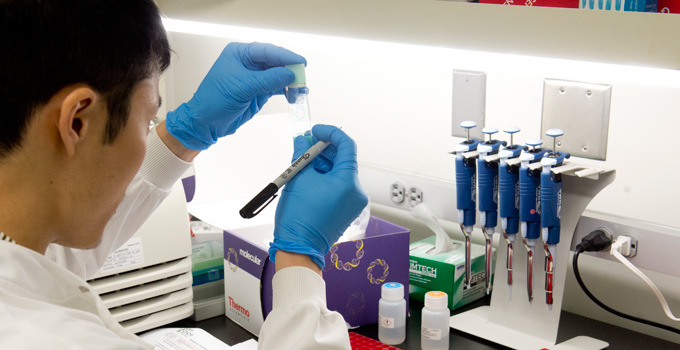
OICR has announced a new retrospective study that will help to identify mutations for breast cancer, increasing understanding of the disease and potentially leading to better diagnosis in the future. The study is led by Dr. John Bartlett, Director of OICR’s Transformative Pathology Program and Dr. Harriet Feilotter, Department of Pathology and Molecular Medicine, Queen’s University. We spoke to Dr. Bartlett about why this study is important for the future of breast cancer diagnosis and treatment.
This is a retrospective study. What does that mean and how does it differ from a clinical trial?
This is a study using cancer samples donated by patients who have already been treated in a clinical trial. Because we are able to access the information on how these patients responded to their treatment, we can look at samples from patients who did well on treatment and compare them with patients who did less well. Understanding why patients don’t get the best outcomes can help us to design future trials of treatments specifically to improve outcomes for these patients.
by identifying biomarkers that tell us which patients may benefit from a drug, we can provide more personalized treatment.
Why does breast cancer need more targeted diagnosis and treatment?
Although many women diagnosed with breast cancer survive for a long time, breast cancer still kills more Canadian women than any other cancer, apart from lung cancer. These women die despite receiving the best treatment we can currently offer. Why do some women survive and some women die even when they received the same treatment? We now recognize that breast cancer is not just one disease but a group of similar diseases with different “switches” that turn on growth in different sub-groups. We need to be able to identify these sub-groups with new diagnostic approaches and treat them with new drugs targeted at each type of breast cancer. Therefore, by identifying biomarkers that tell us which patients may benefit from a drug, we can provide more personalized treatment.
Science is a hugely collaborative process, and if we are to solve the challenge of cancers as fast as possible,
we must work as a team
How will this study help to address this problem?
Our own work in breast cancer here at the OICR has identified “switches” which predict an increase in recurrence following standard anti-endocrine therapy. This study will confirm if techniques that can be applied in Ontario Hospitals today can reliably detect these “switches” using the Thermo Fisher Scientific Oncomine Comprehensive Assay Platform. This is a key component of future clinical trials that will match new treatments to these cancers based on accurate and validated diagnostic tests, leading to improved clinical trial design and ultimately improved clinical management of breast cancer patients.
Why is it important to bring so many partners from academia, health care and industry to work on a project like this?
Science is a hugely collaborative process, and if we are to solve the challenge of cancers as fast as possible, we must work as a team. Every partner, whether academic, healthcare-based or industrial, brings a different skill and insight to the problem. For this project we needed industrial partners to provide access to the latest technology, health care partners to ensure we designed a study that has potential to change clinical practice in real hospitals, and academic partners to bring the latest research ideas forward towards a real world solution.
